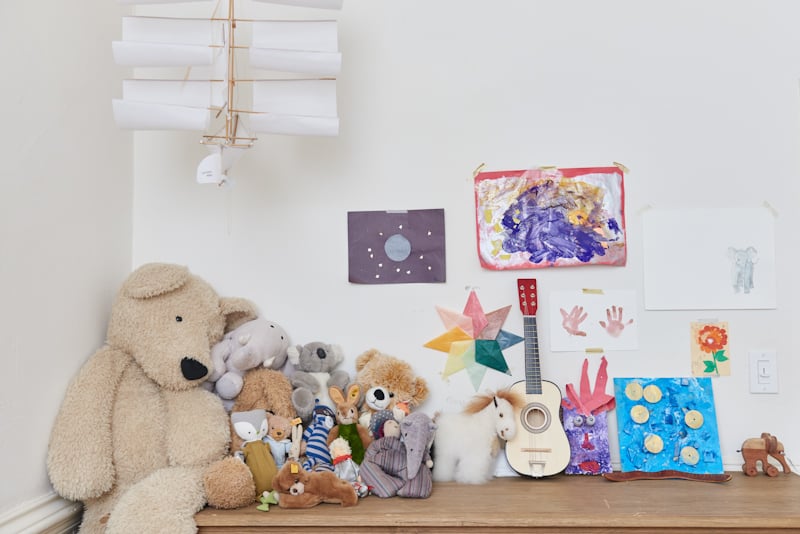
How To Talk To Kids About Sexual Abuse
Written by Julia Feldman
Photography by Photographed by Maria Del Rio
April is National Child Abuse Prevention Month and Sexual Assault Awareness Month. Tragically, under today’s shelter-in-place orders, experts warn that child abuse, sexual abuse, and domestic violence will see a large surge. Below, Julia Feldman, a sexual wellness educator and founder of Giving The Talk, advises how you can talk to your own children about one of the most horrific topics out there: childhood sexual abuse.
As parents, we’re first and foremost charged with keeping our children safe and healthy. We supply them with veggies, disinfect their scratches, do our best to brush all of their little teeth and get them to bed at a civilized time, but what about the more scary and daunting aspects of safety? Nowhere do parents feel more fearful and less equipped than when talking about protecting their children from sexual abuse and violence. This terrifying topic directly relates to many of our parenting hopes and fears, such as our desires to encourage freedom and independence while simultaneously wanting to protect vulnerability and innocence. We can feel pushed and pulled in many opposing directions, so let’s talk about how to best equip ourselves and our children to face the challenges we hope we never will.
Yes, childhood sexual violence and abuse is a terrifying reality. The statistics are scary, both in terms of frequency and the tragic outcomes that many survivors experience. As a parent charged with protecting your children, fear is an appropriate response to this topic, but if you want to best care for your children, you can’t simply stop there. While your fears might be strong motivators, what if we flipped the script? Instead of trying to “prevent violence and abuse,” frame your role in this regard as empowering your children with knowledge and skills to navigate the realities of the world we live in. If we fully embraced this belief, we might feel inspired to be less fearful and more proactive.
So, where do we begin?
Teach your children what it feels like to be loved in a healthy and safe way. Whether or not you realize it, you’ve already begun to prepare your kids. As a parent or caregiver of a young child, you’ve already provided the most important foundation—teaching your child how to give and receive healthy love and modeling what physical and emotional safety looks and feels like. This is an incredibly powerful place to start; teach your child that love feels safe, reliable, consistent, genuine, and without an ulterior motive.
Demonstrate how to communicate about feelings and experiences. Talk about how specific social interactions made you feel and establish the expectation that “in our family, we share our feelings and experiences, even if talking about them is tough.” From the time our kids are young, we need to model how to talk about our bodies—using correct terminology, expressing comfort, and being mindful not to inadvertently (or advertently) communicate shame about bodies or activities involving bodies. The more you can speak matter-of-factly about anatomy, the more your child will understand that there’s no reason to feel ashamed or afraid to share feelings or experiences. When we perpetuate shame about bodies, our children internalize the message that there is something inherently wrong with them; as a result, they might hide embarrassing or scary experiences that involve their body for fear they’ve done something wrong.
We need to talk about what constitutes OK and NOT OK touch. Because self-pleasure is an incredibly normal and healthy behavior (at every age and stage of development), we need to cultivate comfort with talking about intimate and pleasurable touch and normalizing this type of solo behavior, while also communicating expectations for privacy. Who touches our genitals? Yourself, a trusted adult (if they’re helping clean or wipe you) or a doctor who is examining you for medical purposes. Talk about what makes certain touch feel safe and comfortable and what cues we may notice from our bodies if a situation involving touch feels uncomfortable—tummy ache, sweaty palms, nausea, etc.
Foster a culture in your home and community of bodily autonomy. Empower all individuals (especially children) to assert their physical boundaries, and find ways to physically engage with others that feel comfortable. This is especially relevant when saying hello and goodbye; allow your child to refuse hugs or kisses and instead encourage them to identify the methods of interaction that feel safe and desirable for them—high fives, fist bumps, etc.
Practice and create the expectation of consent in all physical interactions. Regardless of whether they’re tickling, hugging, or playing doctor, children should learn early and often that consent (permission prior to physical interactions) is expected and respected. Create frequent opportunities for your kids to consider their feelings about touch and practice articulating and asserting clear boundaries. Make sure children know that adults and older kids never need help with their genitals (going to the bathroom or bathing, for example). People like to be helpful, and when children can help an adult, they often feel special. This vulnerability and opportunity for praise is often abused by predators. Clarify the fact that adults would never need help from a child in this respect and that if they do ask for this type of help, the child needs to tell a trusted adult immediately.
Encourage independence and teach skills related to caring for their own genitals. Learning to care for your own body is empowering for children. Teaching them independence around caring for their genitals (especially in the bath and when using the toilet) will create fewer opportunities in which young children are vulnerably reliant on others for help.
Communicate about the differences between good secrets and bad secrets. “Good secrets,” like surprise parties, are happy, short-term, and generally an expression of love. “Bad secrets” are scary, hurtful, or meant to be kept forever. People who love and genuinely care for you wouldn’t want you to ever keep a “bad secret.”
Don’t focus on “Stranger Danger” since most abuse is carried out by known adults. Focus instead on listening to your gut, communicating your feelings, and never feeling ashamed or bad for asserting boundaries.
Know the signs of abuse and where to seek support if you’re concerned. The most commonly identified signs of childhood sexual abuse relate to talking about or performing sexual behaviors that are inappropriate for the child’s developmental stage, as well as age regressive behaviors like thumb sucking or bed wetting. If you suspect your child has been exposed to abuse, it’s important to remain calm and supportive. Continually reassure your child that they have done nothing wrong and seek out support for yourself and your child. Parents may contact a mental health professional with expertise in child trauma, a pediatrician, as well as Child Protective Services.
Trust your instincts. As a parent or caregiver, never leave your child with someone who makes you uncomfortable. If you have concerns, make them known.
Read books about bodies, consent, and communication. Books are excellent educational tools to cultivate the skills and knowledge you want for your child. Books also double as a bonding experience because you’re spending quality time engaging in the process of learning together. Have books around the house for kids to access on their own and initiate reading them together. The more you normalize open communication, the more present it will be in your relationship with your children. For a great book about consent and boundaries, check out My Body! What I Say Goes!
Helping our children learn to develop a healthy sexuality is a life’s work, but it’s important that we remember the goal is to cultivate something healthy and beautiful, instead of prevent something terrible. Every day, you have an opportunity to demonstrate the healthy, empowered relationship you hope for them to create with their body. Every day, you have an opportunity to engage them in the type of open, honest, caring communication that will keep them feeling safe and wanting to communicate with you through all of the challenges that growing up entails. For ourselves as parents and for our children, let’s strive to be prepared and not scared.
For more more ace advice from Giving The Talk‘s Julia Feldman, you can follow her on Instagram at @givingthetalk, and read her pieces on Raising Kids With Bodily Autonomy, Teaching Toddlers Consent (Starting With Tickles), Rape Culture: What It Is & How To Combat It With Your Kids, and 16 Modern Sex-Ed Books For Kids, Tweens, and Teens.
Leave a Reply to Anonymous Cancel reply
Share this story





Thank you for sharing the post. This is a very important thing to teach our kids.
Beautiful article. This topic is overlooked. Thank you, now I have a better understanding on how to go about preventing this from ever happening to my children
This is the best list I’ve seen. Yes, by experience, the threats are closer than parents imagine and are rarely strangers. One thing I would add is to teach your children that if something feightens them then it’s a sign they should tell and talk about. A lot of children keep it to themselves because it frightens them to talk about it or because they think they are guilty.